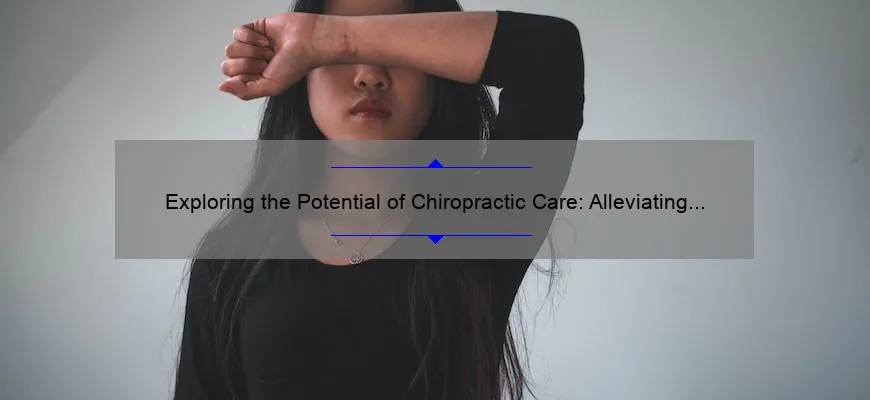Chiropractic care primarily focuses on the alignment and manipulation of the musculoskeletal system. While limited evidence suggests it may help in relieving pain and stress-related symptoms, its direct impact on treating depression and anxiety is yet to be scientifically proven. Seeking medical and psychological interventions are generally recommended for addressing these mental health conditions.
Is Chiropractic Care an Effective Treatment Option for Depression and Anxiety?
Chiropractic care is not typically considered an effective treatment option for depression and anxiety. While chiropractic treatments may have benefits for musculoskeletal issues and pain management, there is limited scientific evidence to support its effectiveness in treating mental health conditions such as depression and anxiety. It is generally recommended to seek professional help from mental health specialists, such as psychologists or psychiatrists, for the diagnosis and treatment of these conditions.
What Role Does Chiropractic Care Play in Mental Health?
Chiropractic care plays a supporting role in mental health by focusing on the connection between the spine and the nervous system. It believes that misalignments in the spine, known as subluxations, can disrupt the flow of nerve impulses, leading to imbalances in the body, including the brain. By correcting these subluxations through spinal adjustments, chiropractic care aims to restore proper nerve communication, which may positively impact mental health. Some patients report improvements in mood, stress levels, and overall well-being after receiving chiropractic treatment. However, it’s important to note that while chiropractic care may provide relief for some mental health symptoms, it should not be considered a primary treatment for mental health disorders. It is recommended to seek professional help and combine chiropractic care with other appropriate therapeutic approaches for comprehensive mental health support.
Can Chiropractic Adjustments Really Help Alleviate Anxiety Symptoms?
Chiropractic adjustments primarily focus on the spine and nervous system, aiming to improve overall health and well-being. While there is limited scientific evidence directly linking chiropractic adjustments to the alleviation of anxiety symptoms, some patients report experiencing a reduction in stress and anxiety levels after chiropractic treatment. However, it is important to note that anxiety is a complex condition that can have various underlying causes. Therefore, it is recommended to consult with a healthcare professional and consider a multi-faceted approach, including chiropractic care along with other appropriate therapies, for managing anxiety symptoms effectively.
How Does Chiropractic Care Address the Connection Between Spinal Health and Emotional Well-being?
Chiropractic care addresses the connection between spinal health and emotional well-being by focusing on the proper alignment and functioning of the spine. The spine houses the central nervous system, which plays a crucial role in transmitting signals between the brain and the body, including the regulation of emotions.
When the spine is misaligned or not functioning optimally, it can lead to nerve interference and imbalance in the body, potentially affecting emotional well-being. Chiropractors use various techniques, such as spinal adjustments, to correct spinal misalignments, reduce nerve interference, and promote proper nervous system function.
By restoring spinal health, chiropractic care can help improve the overall functioning of the nervous system, which may contribute to better emotional balance and well-being. Additionally, chiropractors often emphasize the importance of a healthy lifestyle, including exercise, nutrition, and stress management, which can further support emotional health.
While chiropractic care alone may not directly address all aspects of emotional well-being, it can play a supportive role by optimizing spinal health and promoting overall wellness. It is important to note that emotional well-being is a complex issue influenced by various factors, and chiropractic care should be viewed as part of a comprehensive approach to promoting mental and emotional health.
Are There Specific Chiropractic Techniques or Approaches that Target Depression and Anxiety?
Yes, there are specific chiropractic techniques and approaches that target depression and anxiety. One such approach is called chiropractic adjustments, which involve manipulating the spine to correct misalignments and improve overall nervous system function. By realigning the spine, chiropractic adjustments can help reduce stress on the body and promote a sense of calm and well-being, which can help alleviate symptoms of depression and anxiety. Additionally, chiropractors may employ other techniques such as massage, acupuncture, and nutritional counseling to address the underlying causes of these conditions and provide holistic care. However, it is important to note that chiropractic care should be used as a complementary therapy and should not replace conventional treatment methods for depression and anxiety. It is crucial to consult with a qualified healthcare provider to determine the most appropriate treatment strategy for these mental health conditions.
What Research or Studies Support the Benefits of Chiropractic Care for Mental Health?
There is limited research or studies specifically focused on examining the benefits of chiropractic care for mental health. However, chiropractic care is known to have potential indirect benefits for mental health due to its impact on the nervous system, overall wellbeing, and the mind-body connection.
1. A study published in the Journal of Behavioral and Brain Science in 2016 suggested that chiropractic adjustments may help reduce anxiety symptoms by influencing the autonomic nervous system, which helps regulate stress response and relaxation.
2. Another study published in the Journal of Alternative and Complementary Medicine in 2010 found that chiropractic care was associated with improvements in overall psychological wellbeing, primarily due to the reduction of pain and physical discomfort.
3. Chiropractic adjustments have also been reported to relieve physical pain in individuals with mental health conditions, which can subsequently improve their mental state and overall quality of life.
It is essential to note that more robust and specific research is needed to establish a direct correlation between chiropractic care and mental health benefits. Consultation with a healthcare professional is advised for a comprehensive assessment and appropriate treatment options for mental health concerns.
Are there Any Risks or Side Effects of Seeking Chiropractic Treatment for Depression and Anxiety?
Chiropractic treatment primarily focuses on aligning the spine and nervous system to promote overall health and well-being, not specifically targeting mental health conditions such as depression and anxiety. While chiropractic care may have some benefits for managing stress and improving sleep quality, it is essential to understand that it is not a substitute for medical or mental health treatment for depression and anxiety.
In terms of risks or side effects, chiropractic adjustments are generally safe when performed by qualified professionals. However, like any medical intervention, there are potential risks involved, including soreness, temporary discomfort, or rare instances of more serious complications such as herniated discs, nerve compression, or strokes. These risks are relatively minimal when the treatment is performed by a licensed and experienced chiropractor who follows proper protocols and guidelines.
It is crucial to consult with healthcare providers such as primary care physicians or mental health professionals to discuss holistic treatment options for depression and anxiety. They can provide appropriate guidance tailored to your specific needs and may recommend a combination of therapies, including chiropractic care, to address your overall well-being.
Can Chiropractic Care Be Used as a Complementary Approach Alongside Traditional Psychological Interventions?
Yes, chiropractic care can be used as a complementary approach alongside traditional psychological interventions. Chiropractic care focuses on the spine and nervous system, which are closely connected to overall health and well-being. By improving spinal alignment and nervous system function, chiropractic care can help address physical imbalances that may contribute to psychological symptoms or conditions. Additionally, chiropractors often promote a holistic approach to health and may provide lifestyle recommendations and stress management techniques, which can complement traditional psychological interventions. It is important for individuals seeking chiropractic care alongside traditional psychological interventions to communicate and coordinate with both their chiropractor and mental health professional to ensure comprehensive and coordinated care.
What should I Expect in my First Chiropractic Session for Depression and Anxiety Relief?
In your first chiropractic session for depression and anxiety relief, you can expect a comprehensive assessment of your overall health, including discussions about your medical history, current symptoms, and any specific concerns you have regarding your mental health.
The chiropractor will perform a thorough physical examination, which may involve evaluating your posture, spinal alignment, muscle tension, and areas of discomfort or pain. They may also use various diagnostic tools such as X-rays or other imaging studies to gain a better understanding of your condition.
Based on the findings from the assessment, the chiropractor will develop a personalized treatment plan specifically tailored to alleviate depression and anxiety symptoms. Chiropractic care for mental health often focuses on improving spinal alignment and nervous system functioning as imbalances in these areas can contribute to psychological distress.
During the session, the chiropractor will employ various techniques to address your specific needs. These techniques may include spinal adjustments, mobilization, soft tissue therapy, and lifestyle recommendations such as nutrition and exercise. They may also suggest additional complementary therapies or counseling if deemed beneficial.
It is important to note that while chiropractic care can play a supportive role in managing symptoms of depression and anxiety, it should not be considered a standalone solution. Chiropractors work in collaboration with other healthcare professionals to ensure comprehensive care for your mental health.
Overall, your first chiropractic session for depression and anxiety relief will involve a thorough assessment, personalized treatment plan, and various techniques to promote overall well-being. Discussing your concerns and expectations with the chiropractor beforehand can help ensure that you receive the best possible care for your specific needs.
Testimonials: Real Stories of Individuals Who Found Relief from Depression and Anxiety through Chiropractic Care.
Testimonials provide compelling evidence of how chiropractic care has helped individuals find relief from depression and anxiety. These real stories showcase the transformative power of chiropractic adjustments, demonstrating that it is not only beneficial for physical ailments but also for mental and emotional well-being. Each testimonial highlights the unique experiences and personal journeys of individuals who have experienced profound improvements in their mental health after receiving chiropractic care. These stories serve as an inspiration and encouragement for those struggling with depression and anxiety, giving them hope that there are alternative treatments available that can positively impact their lives.
table {
border-collapse: collapse;
width: 100%;
}
th, td {
text-align: left;
padding: 8px;
}
th {
background-color: #4CAF50;
color: white;
}
Can Chiropractic Care Help With Depression And Anxiety?
| Question | Answer |
|---|---|
| What is chiropractic care? | Chiropractic care is a healthcare profession that focuses on the musculoskeletal system, particularly the spine, to alleviate pain and improve overall health. |
| Can chiropractic care help with depression? | While chiropractic care primarily focuses on physical health, some patients have reported improvements in their mental health, including reduction in symptoms of depression. Chiropractic adjustments may help by promoting proper nervous system functioning and reducing musculoskeletal pain, which can have a positive impact on mental wellbeing. |
| Can chiropractic care help with anxiety? | Similar to depression, there have been reports of patients experiencing reduced anxiety symptoms after receiving chiropractic care. Although chiropractic care is not a direct treatment for anxiety disorders, it may contribute to overall physical and mental relaxation, leading to alleviation of anxiety symptoms. |
| Are there any scientific studies supporting this? | While there is limited scientific research specifically focusing on the direct correlation between chiropractic care and depression/anxiety, some studies have highlighted the potential benefits of chiropractic adjustments on mood, stress reduction, and overall wellbeing. However, further research is needed to establish a definitive link. |
| Is chiropractic care a replacement for traditional mental health treatments? | No, chiropractic care should not be considered a substitute for traditional mental health treatments. It is always recommended to seek professional advice from mental health experts for managing depression and anxiety disorders. Chiropractic care can be considered as a complementary approach that may support overall wellbeing and potentially provide some relief from symptoms. |






